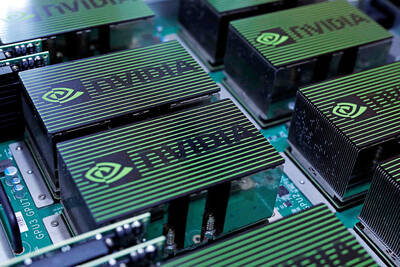The Chinese government is expected to increase import tariffs on semi-finished LCD products to about 5 percent next month, rather than doubling the tax as some had speculated, in the hopes of increasing the incentive for Taiwanese and South Korean LCD makers to build plants in China, market researcher DisplaySearch said.
To protect Chinese LCD panel makers, such as BOE Technology Group Co (京東方), which are market latecomers with weaker technological abilities, the Chinese government was mulling a hike in import duties on semi-finished LCD products.
However, because a dramatic hike in import duties would increase costs for panel makers and weaken their pricing power, LCD companies jostled to obtain one of five licenses to produce TV panels in the world’s biggest LCD TV market last year, before the weak global economy started to take a toll on the industry.
The latest forecast from DisplaySearch now indicates that Beijing will probably hike import duties on LCD cells used by LCD panel makers in the products they export from the current 3 percent duty to 5 percent, while leaving duties on finished LCD modules unchanged at 5 percent.
The 5 percent duty “might not be big enough to drive Taiwanese and [South] Korean panel makers to build factories in China, according to our cost analysis,” DisplaySearch vice president David Hsieh (謝勤益) said on the company’s blog on Thursday.
The less-than-expected tax hikes come amid strong opposition from Chinese TV makers to any drastic increase in import duties because the tax hikes would curb imports from their major panel suppliers — Taiwanese and South Korean LCD panel makers, Hsieh said.
Taiwanese and South Korean LCD panel companies provide better quality flat panels, a more stable supply and a diverse selection compared with Chinese panel companies, Hsieh said.
Because Chinese panel makers “cannot currently provide this [wide] range of panels, raising import duties increases costs for the TV companies,” he said.
Last month, Taiwan’s two biggest LCD panel makers — Chimei Innolux Corp (奇美電子) and AU Optronics Corp (AUO, 友達光電) — accounted for 54 percent of the LCD panels bought by China’s six biggest LCD TV brands, led by Hisense Electric Co (海信) and TCL Corp and Skyworth Group (創維), according to Taipei-based research house TrendForce Corp (集邦科技).
Leading its local rivals, AUO received permission to enter the Chinese market via a joint venture, with China’s Longfei Optoelectronics Co (龍飛光電) to build an 8.5G LCD factory.
Construction of the factory was put on hold this summer after AUO incurred massive losses because of oversupply and stagnant demand. AUO posted losses of NT$40.59 billion (US$1.34 billion) in the first three quarters of this year.
Hsieh said raising import duties to 5 percent was “a compromise between Beijing’s intention to protect domestic panel makers and the cost structure of the domestic TV brands.”

Leading Taiwanese bicycle brands Giant Manufacturing Co (巨大機械) and Merida Industry Co (美利達工業) on Sunday said that they have adopted measures to mitigate the impact of the tariff policies of US President Donald Trump’s administration. The US announced at the beginning of this month that it would impose a 20 percent tariff on imported goods made in Taiwan, effective on Thursday last week. The tariff would be added to other pre-existing most-favored-nation duties and industry-specific trade remedy levy, which would bring the overall tariff on Taiwan-made bicycles to between 25.5 percent and 31 percent. However, Giant did not seem too perturbed by the

AI SERVER DEMAND: ‘Overall industry demand continues to outpace supply and we are expanding capacity to meet it,’ the company’s chief executive officer said Hon Hai Precision Industry Co (鴻海精密) yesterday reported that net profit last quarter rose 27 percent from the same quarter last year on the back of demand for cloud services and high-performance computing products. Net profit surged to NT$44.36 billion (US$1.48 billion) from NT$35.04 billion a year earlier. On a quarterly basis, net profit grew 5 percent from NT$42.1 billion. Earnings per share expanded to NT$3.19 from NT$2.53 a year earlier and NT$3.03 in the first quarter. However, a sharp appreciation of the New Taiwan dollar since early May has weighed on the company’s performance, Hon Hai chief financial officer David Huang (黃德才)

UNPRECEDENTED DEAL: The arrangement which also includes AMD risks invalidating the national security rationale for US export controls, an expert said Nvidia Corp and Advanced Micro Devices Inc (AMD) have agreed to pay 15 percent of their revenue from Chinese artificial intelligence (AI) chip sales to the US government in a deal to secure export licenses, an unusual arrangement that might unnerve both US companies and Beijing. Nvidia plans to share 15 percent of the revenue from sales of its H20 AI accelerator in China, a person familiar with the matter said. AMD is to deliver the same share from MI308 revenue, the person added, asking for anonymity to discuss internal deliberations. The arrangement reflects US President Donald Trump’s consistent effort to engineer

NVIDIA FACTOR: Shipments of AI servers powered by GB300 chips would undergo pilot runs this quarter, with small shipments possibly starting next quarter, it said Quanta Computer Inc (廣達), which supplies artificial intelligence (AI) servers powered by Nvidia Corp chips, yesterday said that AI servers are on track to account for 70 percent of its total server revenue this year, thanks to improved yield rates and a better learning curve for Nvidia’s GB300 chip-based servers. AI servers accounted for more than 60 percent of its total server revenue in the first half of this year, Quanta chief financial officer Elton Yang (楊俊烈) told an online conference. The company’s latest production learning curve of the AI servers powered by Nvidia’s GB200 chips has improved after overcoming key component